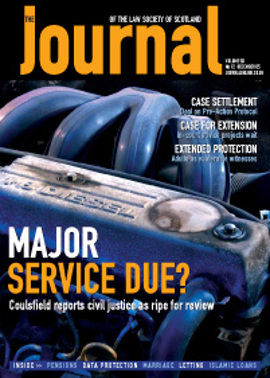Legacy giving in a Scottish climate

Legacies provide charities with their largest single source of voluntary income – currently worth £1.3 billion per year according to a market audit carried out last year – yet fewer than 1 in 20 people support charities in their wills. Many charitable services would not exist without the money left by people in their wills. By increasing the number of people who leave money to charity by just 2%, an additional income of £200 million would be generated for the voluntary sector.
Remember A Charity is a consortium of over 140 UK charities backed by a growing number of legal practitioners, independent financial advisers and professional bodies. Launched in 2002, it is the largest combined effort of its kind in the UK. The campaign’s aim is to raise awareness of charitable will making and make legacy giving the norm.
A key element in this is the need to encourage people to get professional help to prepare or update their wills to ensure that their charitable intentions are fulfilled.
Remember A Charity’s view is that by engaging charitable supporters at the same time as working closely with the legal and financial sectors, the campaign will be able to change prevailing attitudes. “That’s why Remember A Charity has used a two-pronged approach since the beginning of the campaign,” said Jonathan Parris, Director of Remember A Charity. “It is key for us to work closely with the legal profession at the same time as raising the public’s awareness.”
How the profession can help
It is important for solicitors to realise the value to charities of asking their clients if there are any favourite causes they would like to remember in their wills. A donation in a will is a way for clients to support charities close to their hearts whilst ensuring that their family and dependants are adequately provided for.
Including a generic question in the prompt list or a generic clause as part of a draft will sent to clients is an easy way of bringing up the topic. Historically, solicitors preferred to take a reactive rather than a proactive role in offering guidance on leaving money to charity, but recent research suggests that it is becoming the norm for the solicitor to raise the issue.
Crispin Ellison, Executive Director at the Institute of Legacy Management says: “Leaving money to charity in a will brings great inheritance tax benefits. Solicitors have a responsibility to inform their clients of this and give them the chance to support a cause that is important to them.”
The bairns’ share
A good way to include a charity in a will is to leave a proportion of wealth rather than a specific amount. This makes allowances for changes in circumstances and ensures that neither the family nor the charity suffers if the bequeathed money or possessions are no longer available.
This point can be particularly pertinent in Scotland where descendants and a spouse have an automatic right to claim part of the moveable estate, instead of accepting whatever provision the deceased has made for them in the will.
Carole Hope, a partner at Edinburgh firm Murray Beith Murray, says: “Charities rely heavily on money left to them by will. They should always be made aware when there is a possibility of a legal rights claim as the sum they receive might end up much smaller than expected and there may be other consequences.”
A claim will not necessarily reduce the amount payable to the charity, particularly if the charity has been left a legacy of a fixed amount, but the impact on the charity could be substantial in the case of a bequest of residue. The problems are increased when children are underage, as an estate may not be able to be finally settled for some years after the testator’s death, meaning uncertainty for the charity and other beneficiaries.
Legal rights need to be considered when making a will. When a client went to see Carole Hope with instructions for a will to benefit charities and some friends, he was alarmed to be shown how his carefully balanced plan for the division of his estate could be upset by a legal rights claim by his estranged child. Happily, he was in a position where he could afford to make immediate donations to legatees and substantial lifetime gifts to the charities. This considerably reduced the potential legal rights claim and made sure that more of his money would go where he intended – to continue the work of the charities he had supported in his life.
Any number of good causes
Legacies can help a range of charities to achieve a number of different goals. Here are just a few examples:
- Last year, St Andrew’s Ambulance Association in Scotland received nearly £73,000 from legacies. This contributed towards the cost of training and equipping its 211 new volunteers and keeping all 1,500 volunteers up to date with the latest first aid skills and equipment that were used to treat around 20,000 people last year.
- Alzheimer Scotland has received just under half a million pounds in legacies over the last two years. This has allowed it to help just under 200 people with dementia and their carers claim a range of benefits, and provide advice and emotional support to 5,500 people.
- The Scottish Spina Bifida Association received legacies totalling £600,000 last year. This allowed it to embark on an ambitious project to build a much needed family support centre, the first in Scotland to be equipped with a telemedicine suite enabling patients to receive medical advice via video-conferencing equipment from health professionals in hospitals across the UK.
Making it the norm
Remember A Charity is not pushing for particular charities or sector areas to be represented but is concerned with the issue of charitable legacies as a whole. The campaign hopes to make leaving a charitable donation the automatic thing for all of us to do when writing a will and has produced a free will guide for consumers and professionals.
If you would like further information on Remember A Charity or to become a campaign supporter, please visit www.rememberacharity.org.uk or phone 020 7840 1030. All charities and all qualified solicitors are welcome.
Crispin Ellison, Executive Director, The Institute of Legacy Management: www.ilmnet.org
Carole Hope, Partner, Murray Beith Murray: www.murraybeith.co.uk
Jonathan Parris, Director, Remember A Charity: www.rememberacharity.org
In this issue
- Holes in Scotland's corporate killing proposals
- A month of contrasts
- Too small to be flexible?
- Engine overhaul
- Vital voices revisited
- Letting in the law
- Puzzles and paradoxes
- Legacy giving in a Scottish climate
- New deal for PI claims
- Data protection crackdown: do you comply?
- In real terms
- Access route
- Better law-making: just lip service?
- Appealing prospects
- The limits of diversification
- Cashing in on the event
- Farewell then common law marriage
- Scottish Solicitors Discipline Tribunal
- Website reviews
- Book reviews
- Unveiling the Islamic mortgage






